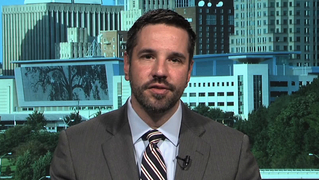
Topics
By Amy Goodman with Denis Moynihan
U.S. Army Reserve Spc. Chancellor Keesling died in Iraq on June 19, 2009, from “a non-combat related incident,” according to the Pentagon. Keesling had killed himself. He was just one in what is turning out to be a record year for suicides in the U.S. military.
In August, President Barack Obama addressed the Veterans of Foreign Wars convention, saying, “[T]here is nothing more sobering than signing a letter of condolence to the family of [a] serviceman or -woman who has given their life for our country.” To their surprise, Jannett and Gregg Keesling, Chance’s parents, won’t be getting such a letter. Obama does not write condolence letters to loved ones of those who commit suicide in the theater of combat. [After making inquiries, the Keeslings discovered that this was not because of an oversight. Instead, it’s because of a longstanding U.S. policy to deny presidential condolence letters to the families of soldiers who take their own lives.]
Jannett told me: “Chancellor was recruited right out of high school, and this was something he was passionate about, joining the military. I wanted him to go to college, but he said that he wanted to be a soldier.” Gregg added: “We had doubts about him joining. … When the war broke out in 2003, when many of us were trying to retreat, Chancy decided, ‘This is my duty.’ … But once he did his first tour … his marriage broke up during that deployment.”
Chance was very troubled during his first tour of duty in Iraq, although he performed admirably by all accounts. At one point he was put on a suicide watch and had his ammunition taken away for a week. After Iraq, Chance declined a $27,000 reenlistment bonus and transitioned to the U.S. Army Reserves, hoping to avoid another deployment. He sought and was receiving treatment at a Veterans Affairs facility. Gregg said, “We sat down as a family, and we said, ‘President Obama is going to be elected, and President Obama will end this war, and you won’t have to go.’ ” But then his son’s orders to deploy came again.
Current laws prevent transfer of mental health information from active-duty military to the reserves, so Chance’s commanders did not know of his previous struggles. Last June, troubled again, he sent his parents a dire e-mail, mentioning suicide. Jannett recalled: “I spoke to Chancellor the night before he died for about four minutes. And as always, he wore a really tough exterior. … But what he did tell me that night is that he was going to have a very long, difficult day. His conversation was quite brief. Normally he would say that he loves me, and he would say goodbye. But this time he simply hung up.”
The next morning, Gregg said, Chance “locked himself in the latrine and took his own life, with his M-4 … our grief is deep. The letter won’t stop [our pain]—we’ll still be hollow inside for the rest of our lives, but the acknowledgment from the president that our son gave his life in service to the causes of the United States is important to us.”
The Pentagon admits to a mounting suicide crisis in its ranks. Numbers of acknowledged suicides have steadily climbed, from fewer than 100 in 2005, by one report, to nearly 200 in 2008, with a like number among Iraq and Afghanistan veterans. Gregg Keesling said that when he and Jannett went to Dover Air Force Base to greet Chance’s coffin, a master sergeant encouraged him to speak out, saying: “I’m greeting a suicide body almost every day. There’s something going on.”
The Keeslings credit Maj. Gen. Mark Graham with helping them through their grief, and working to reduce the stigma of suicide within the military. One of Graham’s sons committed suicide in 2003, while studying as an Army ROTC cadet in college. His other son, also in the Army, deployed to Iraq months later and was killed by a bomb not long thereafter. But the GI Rights Hotline, which advises active-duty soldiers on options for leaving the military, says outside psychological professionals can help suicidal soldiers obtain a medical discharge: “The military wants to know whether the patient can perform their duties without causing trouble, embarrassment or expense. His or her welfare is distinctly less important.”
The United States is engaged in two intractable, massive military occupations, with no end in sight. Obama should certainly write letters of condolence to the Keeslings and to others whose loved ones have found that the only sure way to end the living hell of war, or to escape the horror of its aftermath, is to kill themselves. But an immediate withdrawal from the wars Obama inherited is the only way to stem the bleeding.
Amy Goodman is the host of “Democracy Now!,” an independent, daily global TV/radio news hour airing on more than 950 stations in the United States and around the world. She is the author of “Breaking the Sound Barrier,” recently released in paperback and now a New York Times best-seller.
© 2011 Amy Goodman










